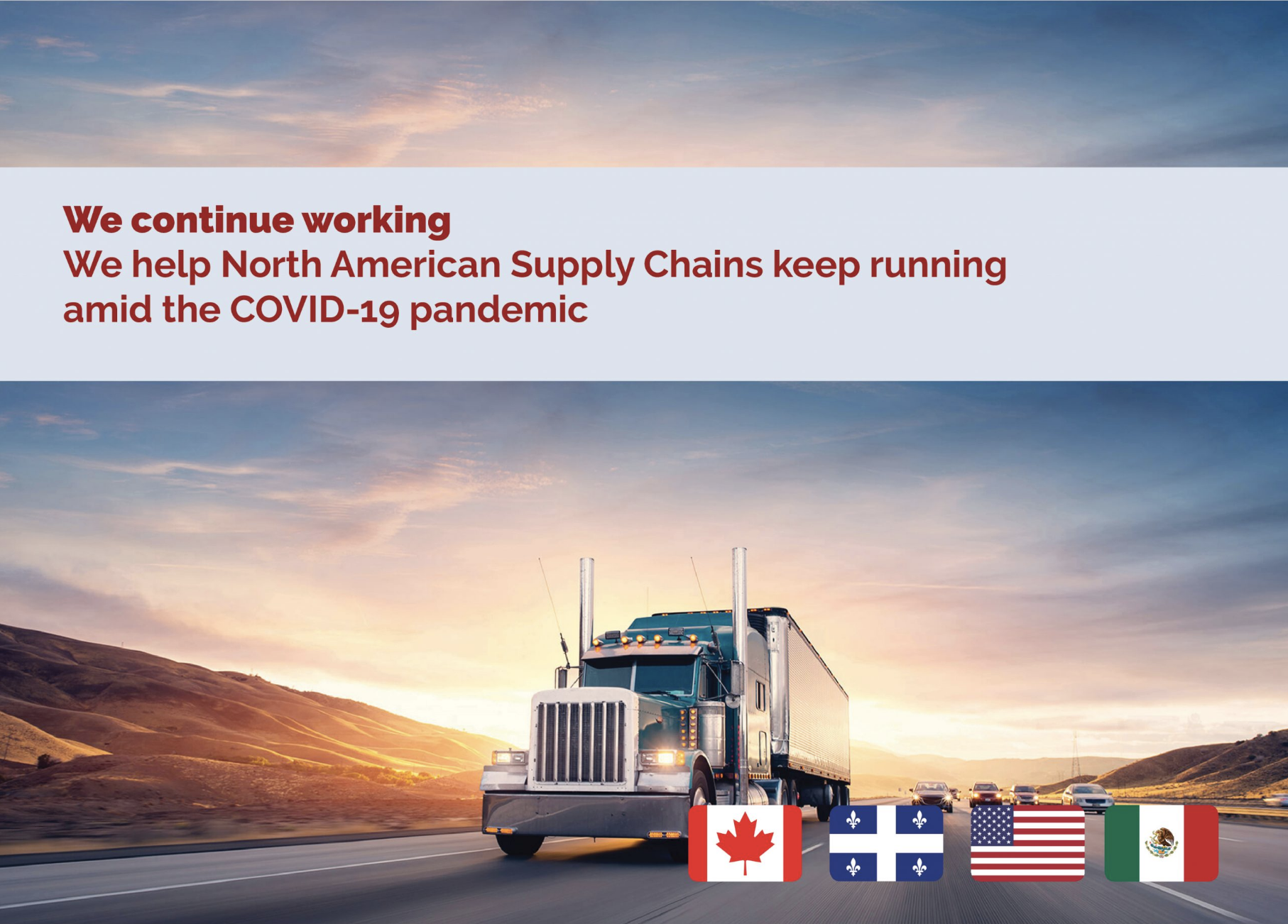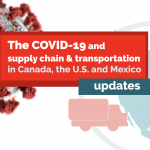Misaligned policy between the U.S. and Mexico on “essential services” is disrupting supply chains
The three North American countries, Canada, the United States and Mexico, have taken measures to protect the health of their citizens during the COVID-19 pandemic, at the same time that they have made efforts to keep essential services open in their countries, preserve basic economic functions and protect supply chains. The problem begins when what appears to be “essential services” for one country does not appear to be as “essential” for the other and when the three countries face different stages of the COVID-19 pandemic.
Mexico and the U.S are in different moments in the pandemic
Recently, Mexico announced the start of ‘Phase 3’ of the COVID-19 pandemic, one of the most dangerous stages, in which if the curve is not flattened, hospitals would be saturated with serious cases; which means that there is a risk that it is not possible to provide health care to all patients and there are more deaths.
One of the measures announced by the Government of Mexico while entering phase 3, is the suspension of non-essential activities in the public, private and social sectors. “It is national in scope and must be enforced at the local level” stressed Hugo López-Gatell, head of the Undersecretariat of Prevention and Health Promotion at the Mexican Secretariat of Health.
Only 4 days after Mexico was starting Phase 3, President of the United States, Donald Trump had unveiled Guidelines for “Opening Up America Again”, a three-phased approach for states and local officials to ease their lockdowns.
At the same time, American protesters started to gather in different cities across the United States to ask governments lift measures put in place to curb the COVID-19 pandemic.
Disparate approaches on what is an “essential service” in Mexico, the US and Canada
Canada, the United States and Mexico have taken steps to suspend “non-essential services” in an effort to slow the spread of the COVID-19. However, there are disparities between what each country considers essential, which has caused supply chain disruptions on sectors that are considered key for the North American Countries.
- In the U.S., the Cybersecurity and Infrastructure Security Agency provided Guidance on the essential critical infrastructure workforce and can be consulted here
- The Government of Canada provided Guidance on essential Services and Functions in Canada during the COVID-19 Pandemic that can be found here.
- In Mexico, the General Health Council published a document where they mention what are the Essential activities. It can be found here.
Supply chains in North America are closely interconnected. If a sector is declared essential in a country but not in the country where its main suppliers are located, supply chains are seriously affected and operations are stopped. This has been the case of the aerospace and defense sector.
Aerospace and Defense is an essential sector in the U.S. but not in Mexico. Ellen M. Lord, Undersecretary Of Defense For Acquisition And Sustainment, declared: “Domestically, we are seeing the greatest impacts in the aviation supply chain, ship-building, and small space launch. We are seeing impacts on the industrial base by several pockets of closure internationally. Particularly of note is Mexico, where we have a group of companies that are impacting many of our major primes.
Pentagon is asking Mexico to reopen international suppliers there. “These companies are especially important for our U.S. airframe production.” Said, Ms. Lord.
Industrial and Commerce Chambers calling on the Governments to open key sectors and alignment of “essential services”
“Success in fighting COVID-19 depends on U.S.-Mexico cooperation on Essential Industries”, declared the U.S. Chamber of Commerce.
“Misaligned policy in the short-term is likely to produce serious long-term consequences at a time when the two countries need each other more than ever.” wrote Neil Herrington, Senior Vice President for the Americas Department at the U.S. Chamber of Commerce.
And continued: “major supply chain dislocations are plaguing key bilateral industries such as automotive, defense/aerospace, electronics, personal care products and semiconductors. These sectors have been deemed “essential” operators in the U.S. but have seen their operations or those of key suppliers shut down in Mexico”.
Mexico’s Confederation of Industrial Chambers (Concamin) also called on the government to declare aerospace, automotive and electronics sectors as essentials.
Automotive industry: in the process of having a trilateral plan for its reopening.
“The Mexican government is working closely with the U.S. and Canadian governments to establish the criteria, guidelines, protocols and conditions that will allow us to successfully move towards reopening the productive activities of the auto industry in North America.
The governments of Mexico, Canada and the United States will make more information about the reopening plan public in the coming days. Our tri-national cooperation will allow the plan to be based on the scientific evidence and best practices shared by the public health agencies of all three countries.” Declared the Government of Mexico.
“The reopening plan will take into account the diversity and complexities in the region, and the fact that each country has areas and locations with different health conditions, degrees of spread of COVID-19, demographic characteristics, and risks and vulnerabilities in the population, and local public health systems with varying capacities for responding to the emergency. Until the plan is operational, the auto industry in Mexico and its supply chains must comply with the suspension of activities mandated by the General Health Council”.











Very good article thanks for sharing energetic information. I really appreciate u . You need to work more to promote your website. I read blog on daily base.